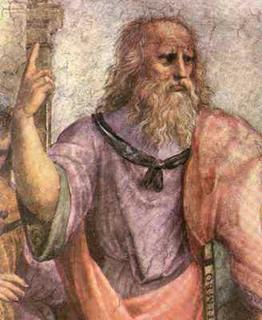 Plato doesn’t like poets, but I do. I’m reading parts of the Republic for my history of philosophy class and am thus meeting the author’s disapprobation of poetry head-on. That’s okay, though. Plato’s a smart dude, and he’s often right, but he’s not right about everything. Through the character Socrates, esteemed the wisest man of his day, Plato denounces art as mere imitation of life, removed by several degrees from the essential content of life. Poetry, as with all art, is but a reflection of what is real, a shadow that flits here and there and then is gone.
Plato doesn’t like poets, but I do. I’m reading parts of the Republic for my history of philosophy class and am thus meeting the author’s disapprobation of poetry head-on. That’s okay, though. Plato’s a smart dude, and he’s often right, but he’s not right about everything. Through the character Socrates, esteemed the wisest man of his day, Plato denounces art as mere imitation of life, removed by several degrees from the essential content of life. Poetry, as with all art, is but a reflection of what is real, a shadow that flits here and there and then is gone.Without meeting all of his objections, which would take much time and thought, I will simply say this: art is valid as an expression of thought and experience. This argument can be over-done and over-lived, but it has validity. Ours is not simply to compute equations and parse grammar. We are not merely rational creatures. We are emotive beings, capable of intensive feeling, and happily able to express it. In reading poetry or fiction, listening to music, or watching drama, we see something of our own experience and are able to process our own lives. Through the arts, we are able to make sense of our lives, to converse with our emotional side, and take in and mull over the sights and sounds, the raw stuff, of living. There is more to art than this, one may say, but these are key elements of the artistic encounter.
All that said, here’s a link to a Lifehouse video that well interprets the current state I find myself in. It’s called “Spin” and it speaks eloquently to driving guitars of the messiness and uncertainty of early adulthood. Enjoy it, and tell Plato and co. that Consumed sent you.

1 Comments:
You miss the force of Plato's objection against Poetry. You value poetry because it is a great medium for self-expression. Plato does not believe that self-expression is a legitimate telos for art; rather, art (just as rhetoric) must be measured against the standard of whether it improves the soul or not. And perhaps he has a point: a healthy soul without "poetry" is far better than the debased soul that expresses its depravity well. Secondly, Plato is not so much worried about the leisured poetry lover who curls up by the fire-side with Milton's Paradise Lost or some poem by Longfellow. Poetry in his day way a much more engaging, dynamic experience featuring music and dramatic performance. Perhaps the cinema in our day comes closest? He worries about the power that mimesis or imitation has over the individual, in particular that power that the medium in question has to eradicate aesthetic distance between the action and the viewer. And here I believe Plato has a point that we would do well to take to heart in a society where the prevalence of audio-visual technology eliminates the opportunity for reflection and thought that one can exert when reading. Dramatic performance as expressed in cinema has a "pipeline to the soul."
Post a Comment
<< Home